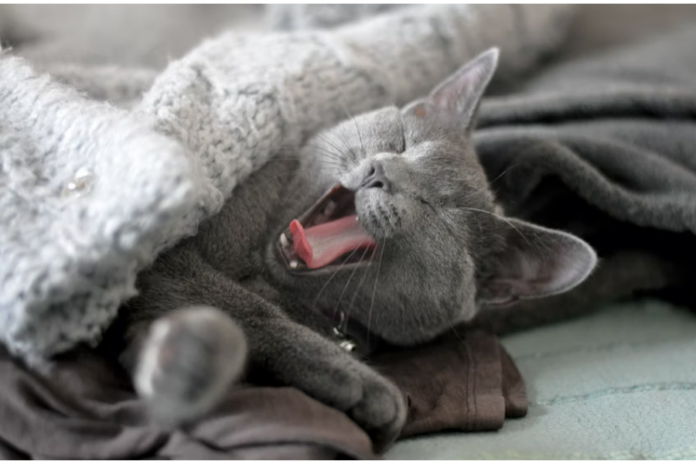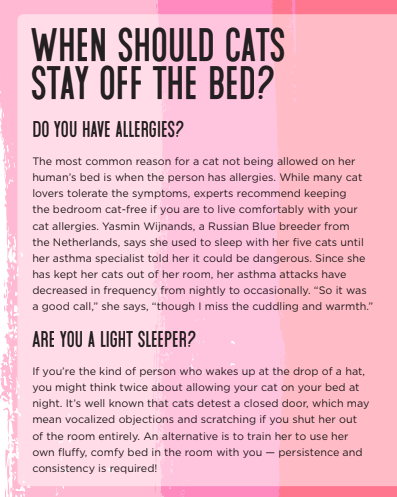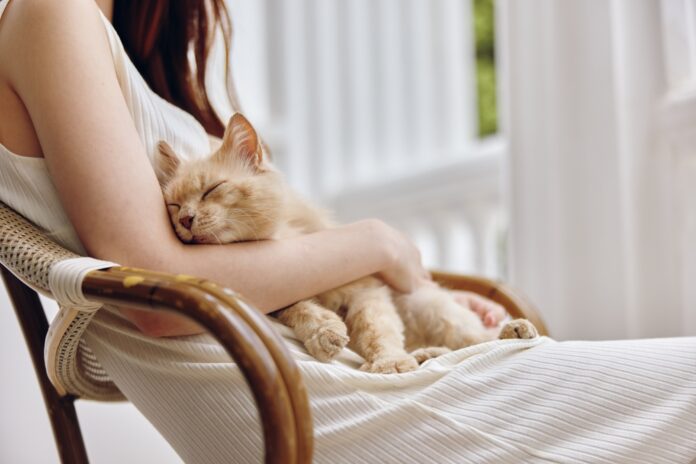Should your cat sleep on your bed?

Few things are more cuddly than a slumbering cat. Let’s look at the pros and cons of allowing your kitty to sleep on your bed at night.
For as long as I’ve had cats, they’ve slept on the bed with me. Although their sleeping preferences varied as much as their coat colors, one thing they’ve all had in common is that they wanted to be close to me. And I’m in good company. According to a 2019 American Pet Products Association survey, 62% of cats share the bed with their humans. Few cat lovers will reject the comfort of soft fur and deep, rumbling purrs at night — even if the cat wants to sleep right in the middle of the bed! But is it really okay to allow our cats to snuggle up with us when it’s time to turn in? Let’s take a look at some of the pros and cons, and how to troubleshoot any issues.
“My cat doesn’t sleep through the night”
Since cats sleep around 15 hours a day, getting them to sleep through the night without waking up in the small hours and wanting to run around the house or play toe tag may be a challenge. Being woken up at 4 am by a suddenly active cat can interfere with your ability to get a good night’s sleep.
Solution: You don’t have to shut your cat out of your room at night. Ensure she’s getting enough exercise during the day, and engage her in a before-bed play session. It’ll help tire her out so she’ll sleep longer.
“She wakes me too early for breakfast”
Cats are crepuscular creatures. This means they are most active at dusk and dawn. If your cat is like many, she may start stirring very early in the morning, demanding breakfast by meowing or walking across your pillow, well before you’re ready to wake up. Unless you’re a very early riser yourself, a hungry kitty can disrupt your sleep.
Solution: Give your cat a healthy snack before turning in the night before. This will reduce the chances that she’ll wake you at the crack of dawn, asking to be fed.
“She takes over the bed”
Some cats have a habit of wanting to sleep on the pillow, or in the very center of the bed, so you end up either having to move them or else contort your body around them. Whether it’s for warmth or love (or both!) cats want to be close to their humans — curled around their heads, tucked under their arms, pressed against their stomachs or the back of their knees, and sometimes right on top of them.
 Solution: Cats usually choose a special spot to sleep and settle in after some goodnight snuggles. Over time, many people simply learn how to “sleep around” that spot. Conversely, when people are too twitchy during the night, some cats will just give up and leave the bed. My own cat, Sofiya, will drape herself over me for petting, then choose a spot at the foot of the bed, or against my legs, where she sleeps through the night. Often, before she went to the Rainbow Bridge, my other cat, Mollie, would be under the covers on one side of me with Sofiya on the other, making me the filling for a feline sandwich!
Solution: Cats usually choose a special spot to sleep and settle in after some goodnight snuggles. Over time, many people simply learn how to “sleep around” that spot. Conversely, when people are too twitchy during the night, some cats will just give up and leave the bed. My own cat, Sofiya, will drape herself over me for petting, then choose a spot at the foot of the bed, or against my legs, where she sleeps through the night. Often, before she went to the Rainbow Bridge, my other cat, Mollie, would be under the covers on one side of me with Sofiya on the other, making me the filling for a feline sandwich!
“My cat might be ‘dirty’”
Many people don’t like the idea of allowing their cats in bed with them because they’re concerned about dander, hair, fleas, or wet paws fresh from the litter box. Others worry that they might get worms or some other icky parasite if they let their kitties sleep on their pillows or under the covers.
Solution: Ensuring your cat is healthy by giving her a proper diet and lifestyle will help minimize skin problems and shedding, while keeping her indoors will eliminate the chances of her catching parasites or other diseases from stray cats and wild animals. Natural flea control products help keep blood-sucking pests at bay, and using a quality non-tracking cat litter will reduce the risk of dirty paws.
Most cat lovers (known as ailurophiles!) are quick to say that having their kitties sleep next to them is comforting and relaxing. And given the stress levels of modern life, it may be the best time of day to bond with your cat. By taking steps to ensure our sleep is disturbed as little as possible, most of us are willing to overlook the minor inconveniences of curling ourselves around a furry body in the middle of the bed, or being gently roused by a few paw pats or whiskered kisses at 2 am.




